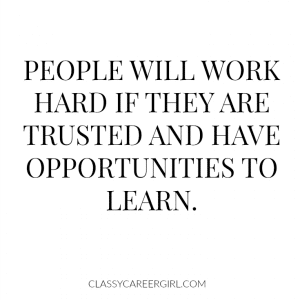[vc_row][vc_column][vc_column_text]
When I was in business school, my favorite class was organizational behavior. I loved learning about the pivotable leaders of productivity and organizational change. I still love learning about how to improve processes and increase effectiveness and productivity in the workplace. Processes and systems are one of my favorite things to implement in my business and one of the reasons I go to work.
So that’s why today I want to dive deep into the real reason why people go to work in the first place. Once you know why employees work, you can start to see how your company can start to increase its productivity too. So let’s take a short walk back through management history.
Why do people really go to work?
(Save this article for later by pinning this image to your favorite board!)
1. People Want to Get Paid For Their Work
In the 1900’s, Frederick Taylor was one of the first management consultants and the father of the scientific movement. He was raised in a Quaker family and had very peaceful and nonviolent values. These values made him not want to see people abused and in conflict.
Taylor started performance-based pay in which high-producing employees would get paid more for producing more. Taylor would go into companies and double the production by organizing jobs better, standardizing skills, and eliminating worker/management conflicts.
2. People Will Support What They Help Create
What Taylor left out of his research was the understanding of the social and psychological aspects of the workplace. In the 1920’s, Kurt Levin was the first to apply psychological contexts to the workplace. He believed that work is central to human life and it must be fulfilling or people will be unhappy and unproductive.
Levin is credited with creating participative management. During his research, Levin performed experiments and found that women were more likely to do something if they were given the ability to be involved in a decision rather than someone telling them what to do. Levin’s findings showed that people will support what they help create.
3. People Want to Be Respected
In the 1950’s, Douglas Macregor came up with the Theory X and Theory Y. In Theory X, employees are lazy and will avoid work if they can. They inherently dislike work and need to be closely supervised with many controls in place.
In Theory Y, employees have a great sense of accomplishment and work is meaningful to them. Employees are ambitious, self-motivated and exercise self-control.
According to the Wall Street Journal, “McGregor’s insights are at the foundation of a management revolution that has literally changed the way the world works.”
The article goes on to say that “Good management requires both a respect for individuals and their capacities, and an insistence on candor, accountability, and excellence.” Theory X believe that managing with fear and control is better than creating enthusiasm and responsibility. I have worked for one of these X managers in the past and it was one of the most belittling and un-motivating experiences I have ever had.
[RELATED: How to Stay Motivated When You Hate Your Job]
4. People Want to Have a Responsibility
I believe that people will go to work and work hard if they are trusted, given responsibility and have opportunities to learn.
Why do you believe people go to work? Your answer will tell you volumes about your own management style.






